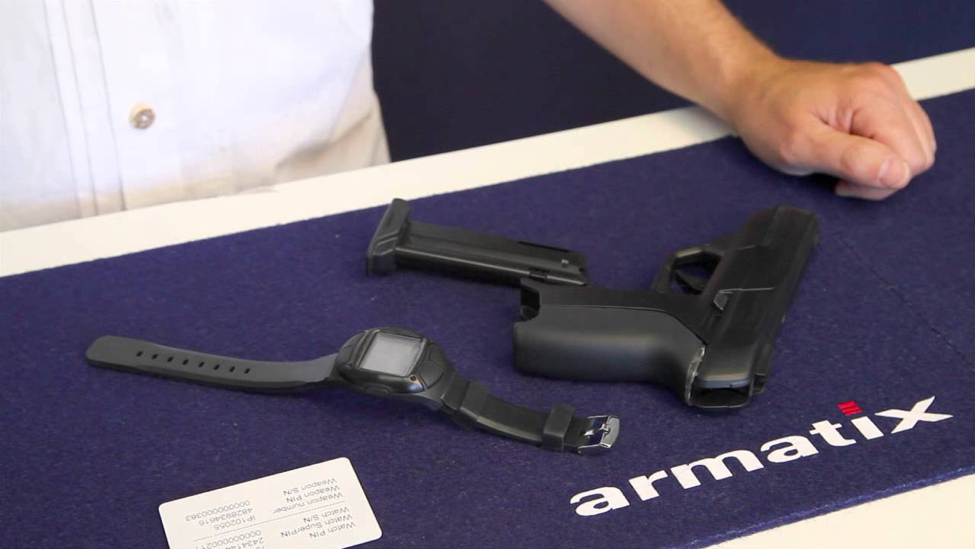By Derek Ciulla
Guns of the future aren’t exactly looking like the guns in Star Wars or other Scifi flicks but they are looking quite different these days. Armatix, a German firearm manufacturer, has created a new handgun called the Ip9. Similar to the very popular 9mm handgun, the Ip9 is a “smart gun” that is furnished with technology that prevents accidental discharge from occurring. Currently, the gun is being exclusively marketed to law enforcement for use in the field, but some law enforcement departments remain apprehensive about the technology.
In order for the Ip9 handgun to operate it requires its user to don a wristwatch which is equipped with a radio-frequency identification (RFID) chip that unlocks the handgun when it is within 10 inches of the firearm. The operator of the Ip9 handgun also has the ability to unlock the gun from a further distance using an app on their smartphone. The app also collects data regarding the number of rounds fired. If the operator isn’t gung-ho about the app or the watch, the Ip9’s grip is a PIN pad which enables the user to unlock the gun by squeezing their fingers in succession. Once unlocked, the gun can be fired until the same PIN is re-entered by the operator, effectively locking the gun.
The Ip9’s technology focuses on inhibiting accidental discharge and personalizing the weapon to the individual. These technological advancements aid to prevent accidental shootings, gun thefts, and criminals using the owner’s gun against them. All of these misfortunes are common occurrences in the United States, so to have a gun that can potentially eliminate such catastrophes, would seemingly be a benefit to society. However, some law enforcement agencies have voiced their skepticism of the handgun. For example, what if an officer is injured in the line of duty and needs to change hands to shoot the gun, but cannot because the other hand does not have the watch? The PIN pad seems to be a fine alternative, but sometimes an officer needs to fire immediately, and even if entering the pin takes seconds, that could be the difference between life and death.
While some police departments, like San Francisco PD, are interested in the Ip9, no police department has introduced any pilot program where the Ip9 can be tested. NYPD Inspector, Raymond Caroli stated: [Smart guns] are something that departments might want to look at, at least in a pilot program capacity. That technology has to be a 100% reliable for an officer to have confidence in that. Is that going to be compromised through blunt force, battery drainage? I mean there’s a host of issues there.” Jim Pasco, head of the Fraternal Order of Police, stated that “Officers shouldn’t be asked to be the guinea pigs in evaluating a firearm that nobody’s ever seen yet.”
The problem with Armatix strategy in exclusively marketing the Ip9 to law enforcement is that it delays adoption by the public, where many argue, is the real problem. There are 30,000 deaths caused by firearms each year in the United States, 800 of which are children. A 2013 report from the Center of Disease Control (CDC) found that 500 people were killed that year by accidental discharge. The need for the Ip9 seems to be with the public first.
However, even if the Ip9 is marketed to the public, Armatix may have a difficult time getting the Ip9 inside stores. In 2002, the state of New Jersey passed a law mandating that as soon as personalized weapons were commercially accessible anywhere in the nation, no other firearm would be permitted for sale. Massachusetts recently proposed a similar law. The obvious dilemma with laws like these is that they jeopardize the firearm industry and other manufacturers involved in conventional firearms. The NRA posted on their website: “NRA opposes government mandates of expensive, unproven technology, and smart guns are a prime example of that.” Ironically, Armatix agrees with the NRA on this issue, as Armatix executive, Wolfgang Tweraser, spoke out against such laws like the one in New Jersey, stating “I don’t think there should be a mandate. Armatix doesn’t want to be at odds with other gun manufacturers.”
The Ip9’s technology clearly has tremendous benefits, but like everything else, it comes with a price. Ultimately, there will have to be a social utility balancing test that individual state representatives are going to need to analyze in order to conclude whether the benefits of such technology are paramount.
Student Bio: Derek is currently a 4L evening division student and Lead Blog Editor with the Journal of High Technology Law at Suffolk University Law School. He holds a B.A. in Sociology from Pace University.
Disclaimer: The views expressed in this blog are the views of the author alone and do not represent the views of JHTL or Suffolk University Law School.

